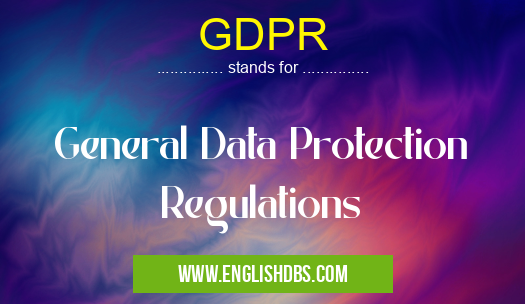What does GDPR mean in DATABASES
GDPR stands for General Data Protection Regulation. It is a comprehensive regulation implemented by the European Union in 2018 that aims to protect the personal data of individuals within the European Economic Area (EEA) and regulate the processing of personal data by controllers and processors.

GDPR meaning in Databases in Computing
GDPR mostly used in an acronym Databases in Category Computing that means General Data Protection Regulations
Shorthand: GDPR,
Full Form: General Data Protection Regulations
For more information of "General Data Protection Regulations", see the section below.
GDPR Meaning
The GDPR defines personal data as any information relating to an identified or identifiable natural person. This includes information such as names, addresses, email addresses, phone numbers, IP addresses, and biometric data.
GDPR Full Form
General Data Protection Regulation
What Does GDPR Stand for?
GDPR stands for General Data Protection Regulation.
Key Principles of the GDPR
Transparency: Individuals have the right to be informed about how their personal data is being processed. Purpose limitation: Personal data can only be collected for specific, legitimate purposes. Data minimization: Only the necessary data should be collected and processed. Accuracy: Personal data should be accurate and up to date. Storage limitation: Personal data should be kept only as long as it is necessary. Security: Robust security measures must be implemented to protect personal data from unauthorized access, use, disclosure, or destruction. Rights of individuals: Individuals have the right to access, rectify, erase, and restrict the processing of their personal data. Compliance: Organizations that process personal data must comply with the GDPR's requirements or face significant penalties.
Essential Questions and Answers on General Data Protection Regulations in "COMPUTING»DB"
What is the GDPR?
The General Data Protection Regulation (GDPR) is a legal framework that sets out rules for the protection and processing of personal data of individuals within the European Union (EU) and the European Economic Area (EEA).
When did the GDPR come into effect?
The GDPR came into effect on May 25, 2018.
Who does the GDPR apply to?
The GDPR applies to any organization that processes personal data of individuals located in the EU or EEA, regardless of where the organization is based.
What is personal data under the GDPR?
Personal data is any information that relates to an identified or identifiable natural person. This includes name, address, email address, phone number, and online identifiers such as IP addresses.
What are the key principles of the GDPR?
The key principles of the GDPR include:
- Lawfulness, fairness, and transparency
- Purpose limitation
- Data minimization
- Accuracy
- Storage limitation
- Integrity and confidentiality
- Accountability
What are the rights of individuals under the GDPR?
Individuals have the following rights under the GDPR:
- Right to access their personal data
- Right to rectify inaccurate personal data
- Right to erasure (right to be forgotten)
- Right to restrict processing
- Right to data portability
- Right to object to processing
What are the consequences of non-compliance with the GDPR?
Non-compliance with the GDPR can result in significant fines, up to €20 million or 4% of the organization's global annual turnover.
Final Words: GDPR is a landmark regulation that has transformed the landscape of data protection worldwide. It has raised awareness about the importance of protecting personal data and has empowered individuals with greater control over their personal information. Organizations that process personal data must take appropriate measures to comply with the GDPR or risk facing legal consequences.
